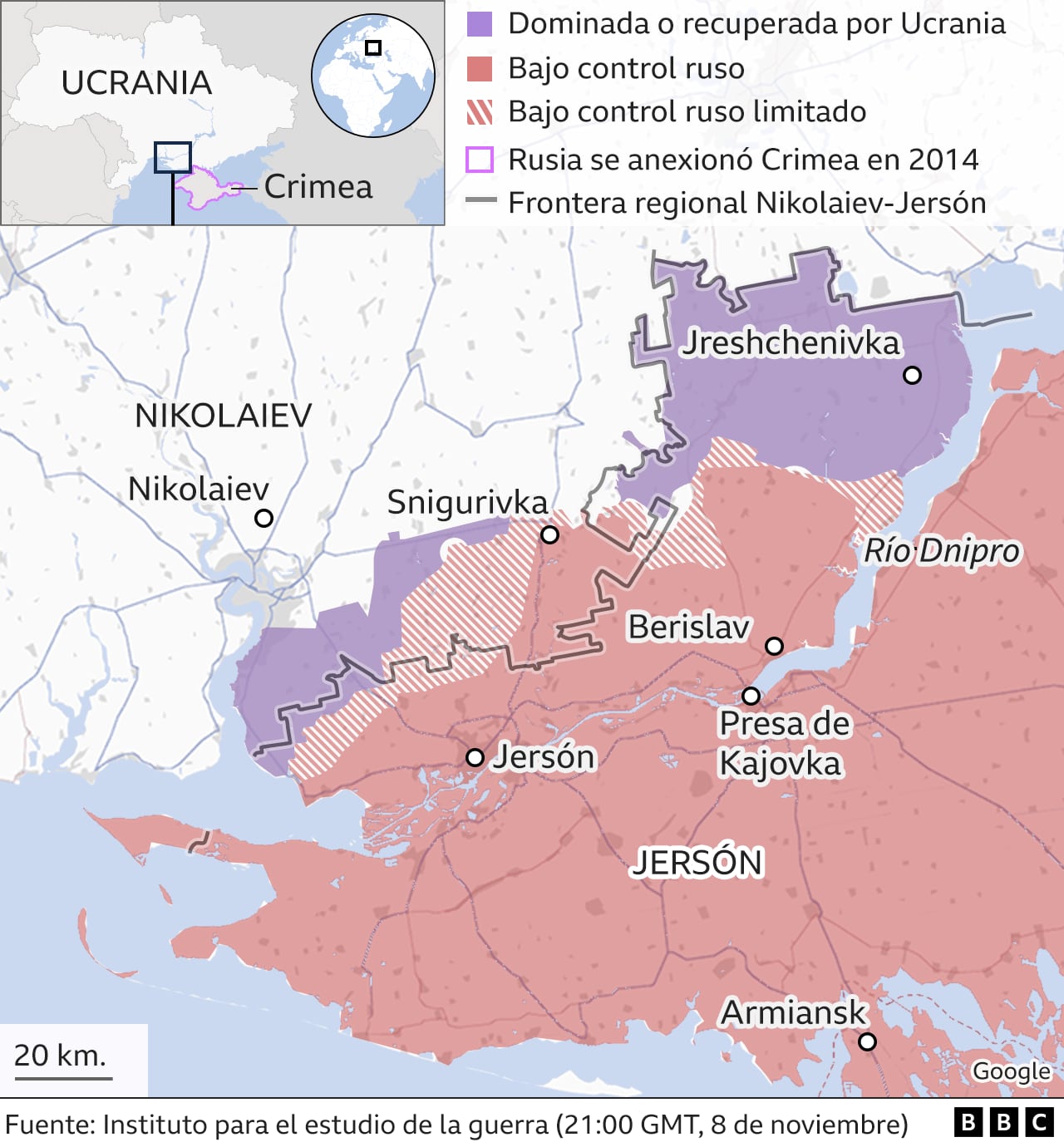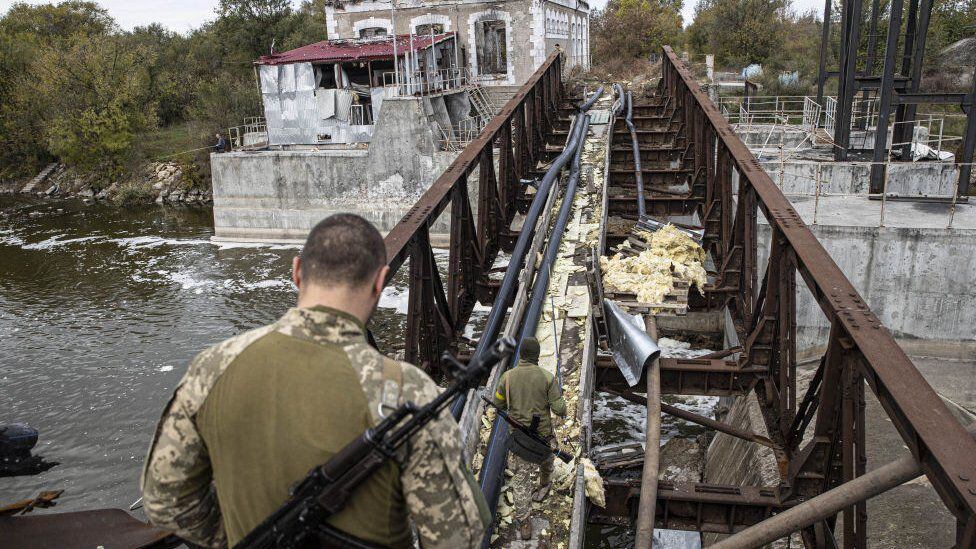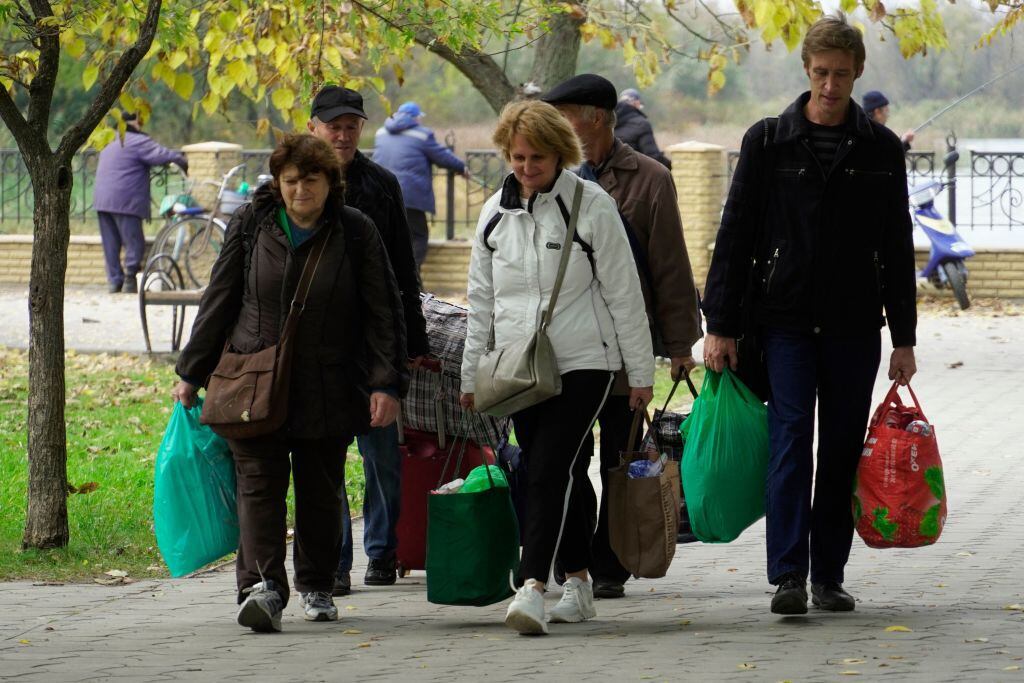Signal of defeat or strategic retreat?
After days of rumours, the Ministry of Defense Russian confirmed that its troops have begun to leave the region of Kherson in the direction of the east bank of the Dnipro River.
Look: NATO chief sees Russia’s withdrawal from Kherson as ‘another victory’ for Ukraine
Although the Russian government does not use the word “withdrawal” but rather speaks of “maneuvers in strict accordance with the agreed plan”, the withdrawal of its troops from the main conquest achieved to date clearly implies “a humiliating setback for Putin’s plans”, as many analysts have assured.
Kherson it has been the only major city that Russia has managed to occupy during the war and, as Andrei Goryanov, head of the BBC’s Moscow bureau, who is in exile, recalls, it has been barely a month since President Vladimir Putin proclaimed that this territory would remain “forever” in Russia.
This week, however, Russian troops are leaving the region with the approval of Putin himself.
Until now, the region had been key to Moscow’s strategy.
Its occupation allowed Russia to have land access from the mainland to the Crimean peninsula, and it intended to make spearheading the western cities of Odessa and Nikolaievwith the aim of thus isolating Ukraine from the Black Sea.
But Ukrainian military advances in the south, and operations such as those that led to the sinking of the Moskva, the flagship of the Russian fleet in the Black Sea, have exposed the shortcomings and poor preparation of the Russian army.

Thanks to the US-made HIMARS missiles, the Ukrainian troops have also succeeded in destroying the bridges that connect the two banks of the Dnipro River, which has cut off the supply of ammunition and supplies for Russian soldiers.
“Russian troops in Kherson they would starve if they stayed there longer,” says Goryanov, for whom the withdrawal “it was inevitable and only a matter of time”.
However, as the BBC’s special envoy to Ukraine, Jeremy Bowen, explains, it is also possible that, militarily speaking, this withdrawal is the “most sensible thing the Russians have done since the start of the war”.
Abandon the western position of the city, which is increasingly untenable, to reorganize across the riverwould complicate an eventual Ukrainian offensive, Bowen points out.
The eastern bank of the Dnipro is being fortified, according to satellite images showing how Russian troops have dug more than 100 miles of defenses along the river, from the Nova Kakhovka dam to the Black Sea.
Russia would also be building concrete bunkers to defend this river bank.
The Ukrainian press has compared these fortifications to the “Atlantic Wall” created by the Nazis to try to stop the Allied landings during World War II.
NATO Secretary General Jens Stoltenberg has said Russia is under pressure, calling the withdrawal “another victory” for the Ukrainians.

But the withdrawal of the troops is not without danger, as Mijailo Podoliak, adviser to Ukrainian President Volodymyr Zelensky, has warned.
For starters, Russian forces may have mined the city and placed booby traps for when Ukrainian troops enter the territory.
Leaving the western bank of the river, from where they have “evacuated”, many times by force, a large number of civilians, Russia could, according to Podoliak, now bomb Kherson mercilessly.
Furthermore, as the adviser recalls, every time Russia has suffered a military setback, its response has been to punish the population even more, for which they could expect more missile and drone strikes to make winter as miserable as possible for Ukrainians.
On Wednesday, Zelensky assured that they were proceeding “very carefully, without emotion, without unnecessary risk, with the aim of liberating all of our land so that the losses are as small as possible.”
For the moment, the Ukrainian army has not wanted to “deny or confirm” the withdrawal of Russian troops, although they assure that they continue to make advances in the south.

In the last hours they have recovered the key city of Snigurivka, about 50 km north of Khersonwhich is an important railway communications hub for Nikolaiev.
There have also been advances on the west bank of the Dnipro towards Berislav. In total, 264 km2 of territory have been recovered, according to Valerii Zaluzhnyi, commander-in-chief of the Ukrainian Armed Forces.
Khersonwhich before the war had a population of 380,000 people, “it is the door to Crimea”, Marina Miron, a defense studies researcher at Kings College London, explains to the BBC. “Regaining it could pave the way to reconquer Crimea, something Ukraine is seeking to achieve in this war.”
The withdrawal of Kherson it has, according to Andrei Goryanov, “an enormous military, symbolic and political impact”.
Next to demoralizing effect what this defeat means for the Russian troops, the withdrawal of Kherson and the construction of a new line of defense to protect against an eventual attack on the Crimean peninsula, changes the course of the conflict: from now on, it becomes a defensive war for Russia.
On a symbolic level, Kherson It is also a failure for Moscow: after 8 months of war, they have failed to show significant results.
But the political impact is, according to the BBC’s Russian correspondent, much more severe. “The Putin regime is based on the idea of Russia as a superpower. Significant defeat on the battlefield at the hands of a much smaller country calls this whole idea into question,” Goryanov explains.
As a consequence, the Russian president is drawing criticism from the hard-line wing of the regime, and the word “negotiations” is increasingly being heard in the Russian vocabulary.
Ukraine, for its part, has already said that it is not willing to negotiate until Russia withdraws from all occupied territories and pays compensation.
Source: Elcomercio
I, Ronald Payne, am a journalist and author who dedicated his life to telling the stories that need to be said. I have over 7 years of experience as a reporter and editor, covering everything from politics to business to crime.

:quality(75)/cloudfront-us-east-1.images.arcpublishing.com/elcomercio/GIZTCOJNGEYS2MJQKQYDAORSGM.jpg)


:quality(75)/cloudfront-us-east-1.images.arcpublishing.com/elcomercio/JE5D2BSYENDC7LIFHKO4QGWR4Y.jpg)
:quality(75)/cloudfront-us-east-1.images.arcpublishing.com/elcomercio/UHH47E2VSRDY5LUVGO5UAYIFZU.jpg)

